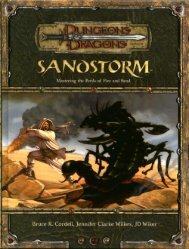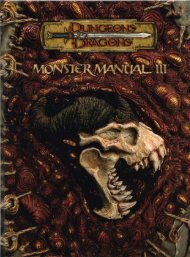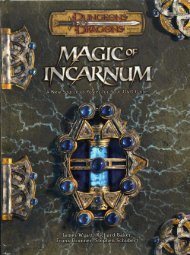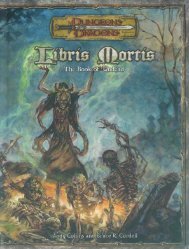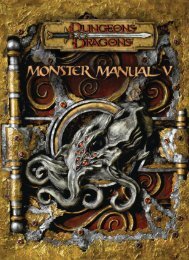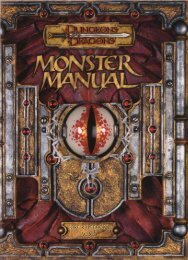Epic Level Handbook
Epic Level Handbook
Epic Level Handbook
- No tags were found...
You also want an ePaper? Increase the reach of your titles
YUMPU automatically turns print PDFs into web optimized ePapers that Google loves.
Though their backgrounds and ideologies may vary bygreat degrees, the council members share one beliefabove all else: They must prevent total chaos anddestruction from reigning across all the planes by steeringevents in a direction and manner of their choosing.Members of this council include some of the most powerfularchwizards, battle-tested warriors, and ferventholy leaders ever known, as well as heads of guilds,fiends from the Nine Hells, no less than three dragons, abeholder, both good and evil fey, and a host of otherplanar creatures, all bent on preventing the ultimatemayhem that results from the abuse of power.Older than old, the reputed first and original councilmember Mella Theeg still sits on the council—actually, the council meets around her, since she doesn’tmove much.Mella Theeg (LN female advanced treant Wiz36/Brd20) is a founding member of the Regulators. She givesproof to the idea that the Regulators have been aroundalmost forever, since she claims to number her years oflife in the millions. A mighty tree-being, she has notstirred from the inner council chamber at the center ofthe Citadel of Regulation for eons. She is a repository forall knowledge and history accumulated by the Regulators,and the other council members often defer to herflawless memory and incisive directives.RECRUITINGNo one initially chooses to join the Regulators. Instead,the Regulators choose their new members from amongthose who have been contracted to carry out Regulatorwork (unknowingly, of course; the Regulators don’tannounce themselves when hiring specialists to handletasks). Such candidates must demonstrate a willingnessto serve and obey and an ability to use subtle methods toaccomplish their goals. Once a candidate has beenestablished as appropriate for the type of work necessaryto serve the Regulators, recruiters begin a secretscreening process, learning more about the candidate’sattitudes toward chaos versus stability, desire for powerfor its own sake as opposed to being the power behindthe throne, and so on. If a candidate exhibits the appropriateopinions and seems qualified in other ways, theRegulators approach him or her with an offer of fulltimeservice.The Regulators consider new members of all classesand backgrounds. While rogues’ and bards’ skills come inhandiest in the service of the Regulators, the need for alltypes of skills is obvious; however, to succeed, everyagent must be able to deflect notice, to appear convincinglyas someone other than what he or she truly is. Thus,powerful warriors, cunning sorcerers, holy leaders, andeveryone in between all have parts to play in the ongoingmachinations of the Regulators.New members initially receive straightforward assignmentsof finite duration. Commonly, a recent enrolleegets assigned as an aide to a proven agent who is currentlyundercover as an advisor or a council member.Eventually, as trust develops, the member receives moresophisticated assignments. Eventually, the member gets apermanent position somewhere, carefully and secretlyworking as the guiding hand of a secular power, with hisown cadre of agents to assist him.MEMBER BENEFITS ANDRESPONSIBILITIESMembership provides few straightforward and tangiblebenefits. To avoid notice, the Regulators charge no duesand pay no stipends (except in special cases). Not eventhe most outstanding members get awards or recognition.They can only enjoy the satisfaction of a job welldone. Occasionally, special equipment and supplies, oraid in the form of another agent, passes down from superiorto agent in the field, but as with all things, thisprocess is kept low-key and out of sight.Any member of the Regulators ultimately answers tothe organization, above all else, even nations or deities. Itsmembers shoulder the weight of the worlds with graveseriousness. Sometimes, agents are asked to carry outtasks that, on the surface, may seem confusing or evencontrary to what that agent believes, but the commandsare never to be questioned. Turning your back on theorders of a superior, working against those instructions,or trying to stop another agent from carrying thoseorders out merits death. Agents never really leave theorganization. They may retire from active service after atime or when it would be impossible for them to everagain show their faces in a public forum, but even then,they are still considered members and expected to servethe Regulators.ENCOUNTERSCharacters in a campaign have many opportunities tocross paths with the Regulators. Initially, the charactersshould stumble across this organization’s activitiesand machinations from a peripheral position, possiblynot even aware of what’s happening. The Regulatorsmay have agents planted behind positions of powerwith which the characters interact, such as an advisorwho serves the noble the characters are working for.Alternatively, if one or more of the characters wieldspower in a leadership position (perhaps a minor landgrant, or a stronghold that has been built on the frontier),perhaps one of their own trusted advisorssecretly serves the Regulators. At the start of any ofthese cases, it’s a good idea to keep the agent’s affiliationa secret.Instead, the characters might find themselves in themidst of some Regulator plot to shift the balance ofpower in a region or on a particular plane, beginning towork at cross purposes with the organization, againwithout initially even realizing who they are up against,if a prominent political figure fears that some unknownassistant is passing information to his enemies, he mighthire the characters to find out the truth and, even if itturns out to be a completely different outcome fromCHAPTER 6:AN EPICSETTING245



